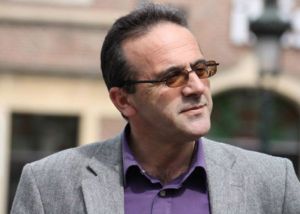Independent Civil Minsk Process Initiative’s Recommendations on the Nagorno-Karabakh Issue
18:11, November 14, 2014 | News, Other news The statement lately signed in Helsinki by the Independent Civil Minsk Process Initiative conveys key messages and ignoring such messages means not to seek a peaceful settlement of the Nagorno-Karabakh conflict. This is the opinion expressed by Artur Sakunts, Chairman of the Helsinki Citizens’ Assembly Vanadzor in his interview with Lragir.am.
The statement lately signed in Helsinki by the Independent Civil Minsk Process Initiative conveys key messages and ignoring such messages means not to seek a peaceful settlement of the Nagorno-Karabakh conflict. This is the opinion expressed by Artur Sakunts, Chairman of the Helsinki Citizens’ Assembly Vanadzor in his interview with Lragir.am.
Note that this initiative is lead on behalf of the both conflicting sides by Davit Shahnazaryan, Ambassador Extraordinary and Plenipotentiary, RA President’s special envoy in 1992-1995 and Eldar Namazov, Assistant to the President and Head of Secretariat of the Republic of Azerbaijan in 1993-1999, respectively. Back in 2010, the Initiative issued another similar statement on the resolution of the Nagorno-Karabakh issue.
According to Artur Sakunts, this statement came to show that all the issues not settled at the level of the authorities yet are already settled at the level of civil society. Therefore, such statements should be considered quite a positive result that should form the basis for the further actions of both the Minsk Group and any other entities involved in conflict resolution.
Noting that the state of affairs with the unresolved issue of the Nagorno-Karabakh was beneficial for Russia, Artur Sakunts stated that the statement above contained recommendations and approaches meeting the vital interests of the conflicting nations and should, therefore, receive due attention.
“That is to say, the initiative comes to develop a format and open an opportunity to further the vital interests of the citizens of the parties to the conflict, i.e. to live in peace, have guarantees for democratic, legal and economic development; interests that were combined in an integral format. This format summarizes the idea of generalized interests. From this perspective, all the forces striving for the peaceful settlement of the conflict and democracy cannot but pay attention to the document. Ignoring such issues essentially means supporting the war and those who intend to resolve the issue by force”, he says.
Artur Sakunts notes some key facts in this statement. According to him, the first fact is that the statement featured the tense situation on the border in late July and early August of this year. The both parties mentioned in the statement the situation above as an example showing that the unresolved conflict is fraught with unpredictable consequences which can be used by international actors.
By saying international actor, Sakunts means the Putin-led Russia that provokes war to weaken the both sides.
Another essential aspect is that the statement urges the parties to start drawing the road map for the final settlement of the conflict.
“Another critical point of the statement is that it recommends laying down the principle of peaceful settlement of disputes, along with the 3 key principles underlying the activities of the OSCE Minsk Group, namely non-application of force, territorial integrity, and right to self-determination and equality of nations. This means that any disputes must be settled peacefully. This aspect of the statement in itself constitutes quite a significant recommendation first of all to the Minsk Group co-chairs”, said Artur Sakunts.
He also noted that according to the statement, the initiative had presented some recommendations back in 2010 that were, however, ignored by the Minsk Group. The recent recommendations are similar to the previous ones and at the same time state that ignoring such recommendations made by the civil society members might lead to worsening situation.
Sakunts highlighted the fact that the authors of the statement considered it necessary to involve international forces to secure peace. “While we are aware that there is an attempt to involve the Russian peacekeeping forces in the process, the statement says that involving international peacekeeping forces might count among permissible ways to secure peace. Essentially, this comes to support the famous statement by the Minsk Group co-chair Warlick”, Arthur Sakunts said.
According to Artur Sakunts, another critical issue featured in the statement is that the parties stress the necessity of banning the sale of arms, especially attacking weapons to the region. “Given the unresolved conflict, the ongoing arms race comes to constitute a major risk factor. As we know, the key actor in the arms race is Russia. The statement emphasizes that the international community should take effective steps to put an end to the sale of arms in the conflict region”, he said.
The statement also highlights the issue of removing the snipers from the front line that constitutes another essential point, according to Sakunts.
“It appeared somewhat strange to me that this statement featuring the Nagorno-Karabakh issue and conveying quite significant messages failed to initiate adequate public discussions. Even the recommendations therein failed to generate any discussions. This is a document signed by the representatives of the Armenian and Azerbaijani societies and it deserves due attention, since ignoring it would mean to give up the interest in the issue whereon political or public figures attempt to express their attitudes in other situations. It is strange that they keep silent in this case. Whenever they keep silent on vital and essentially significant recommendations, they appear to be engaged with populism,” noted Arthur Sakunts.
